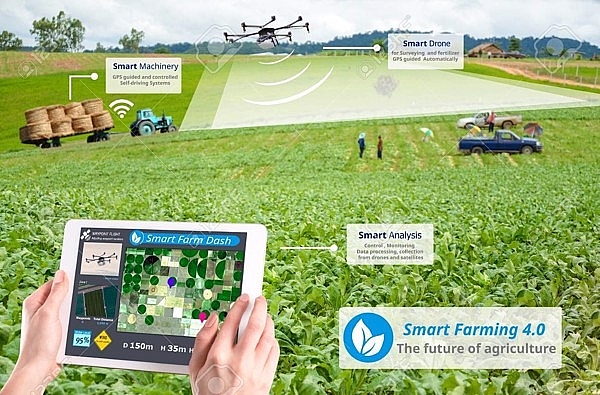VBF 2018: Investment opportunities in smart agriculture
 |
| There are great opportunities in smart and connected technology in agriculture (Image source: thegioinhanong.org) |
The introduction of mineral fertiliser and the industrialisation of production processes, connectivity, and data management are bringing the Fourth Industrial Revolution into farming. Smart digital farming has been recognised as the highest-ranking technology opportunity in terms of its expected positive impact on society.
While precision agriculture (the use of satellite navigation, remote sensing, and other tools to farm each square metre as efficiently and sustainably as possible) has been evolving for some time, and information technology has now reached a point where it is not only possible to collect vast quantities of data, but also to use quite inexpensive, small processors to make use of this information to control different pieces of equipment or monitor individual animals.
A report of Agri-Business Working Group at Vietnam Business Forum 2018 today noted that a growing number of farmers in Asia and in Vietnam are starting to adopt digital technology and data-driven innovations. Thanks to digital connectivity, intelligent agricultural machines can connect in a working process by consulting, for instance, weather data and ordering spare parts or accessing field-specific information from a central, cloud-based farm management software.
Big Data can deliver bigger yields and greater environmental protection. Farms in Germany using advanced digital technology have reported higher yields per hectare while reducing nitrogen levels significantly, as well as cutting herbicide and diesel use by 10 and 20 per cent, respectively.
However, in Vietnam, farmers are still operating with the tools of the Third Industrial Revolution, utilising a basic personal computers, the Internet, and simple ICT, with many a whole era back, relying on the telephone and internal combustion engines. They are a long way from understanding or utilising the benefits of Industry 4.0.
For Farming 4.0 to become a reality, David Whitehead, the head of the VBF Agri-Business Working Group, said that Vietnam needs dedicated joint efforts between the public sector, industry players, and the farming community. Above all, decision-makers and the government need to ensure the fundamental digital infrastructure for rapidly growing data flows, network coverage, and transmission rates in rural areas.
"We need supportive government policies that help to address the investment gap in agriculture, particularly in times of low commodity prices, as well as boosting farmers' ability to invest in those innovative digital technologies and equipment that have proven beneficial to both the society and the environment," added David.
In parallel, industry players must strive to create a competitive and innovation-friendly landscape that enables the flow of data streams and encourages fair competition at all levels. It is also important to ensure that the necessary digital skills are developed and that there is an openness about potential new business opportunities and models that may be available for the digital transformation.
For instance, with retailers and consumers increasingly interested in the traceability of the food they purchase and eat, the ability to collect data on exactly how a crop was grown or an animal reared could become an invaluable asset, particularly if Vietnam wants to be competitive on the world stage and in the global supply chain. This can help producers deliver high-quality specialised produce, fully traceable to the field, and could allow supermarkets to offer a better choice to their customers.
Farming 4.0 is coming along with investment opportunities in high-tech agriculture, and a new farming revolution triggered by the adoption of staggering new technologies like satellites, high-precision positioning systems, smart sensors, and a range of IT applications combined with high-tech engineering and robotics.
What the stars mean:
★ Poor ★ ★ Promising ★★★ Good ★★★★ Very good ★★★★★ Exceptional
Related Contents
Latest News
More News
- Japanese business outlook in Vietnam turns more optimistic (January 28, 2026 | 09:54)
- Foreign leaders extend congratulations to Party General Secretary To Lam (January 25, 2026 | 10:01)
- 14th National Party Congress wraps up with success (January 25, 2026 | 09:49)
- Congratulations from VFF Central Committee's int’l partners to 14th National Party Congress (January 25, 2026 | 09:46)
- 14th Party Central Committee unanimously elects To Lam as General Secretary (January 23, 2026 | 16:22)
- Worldwide congratulations underscore confidence in Vietnam’s 14th Party Congress (January 23, 2026 | 09:02)
- Political parties, organisations, int’l friends send congratulations to 14th National Party Congress (January 22, 2026 | 09:33)
- Press release on second working day of 14th National Party Congress (January 22, 2026 | 09:19)
- 14th National Party Congress: Japanese media highlight Vietnam’s growth targets (January 21, 2026 | 09:46)
- 14th National Party Congress: Driving force for Vietnam to continue renewal, innovation, breakthroughs (January 21, 2026 | 09:42)

 Tag:
Tag:























 Mobile Version
Mobile Version